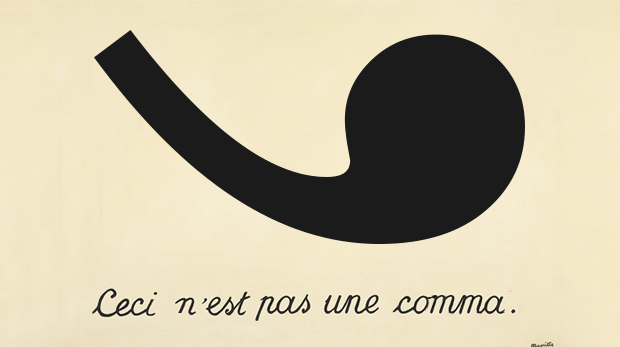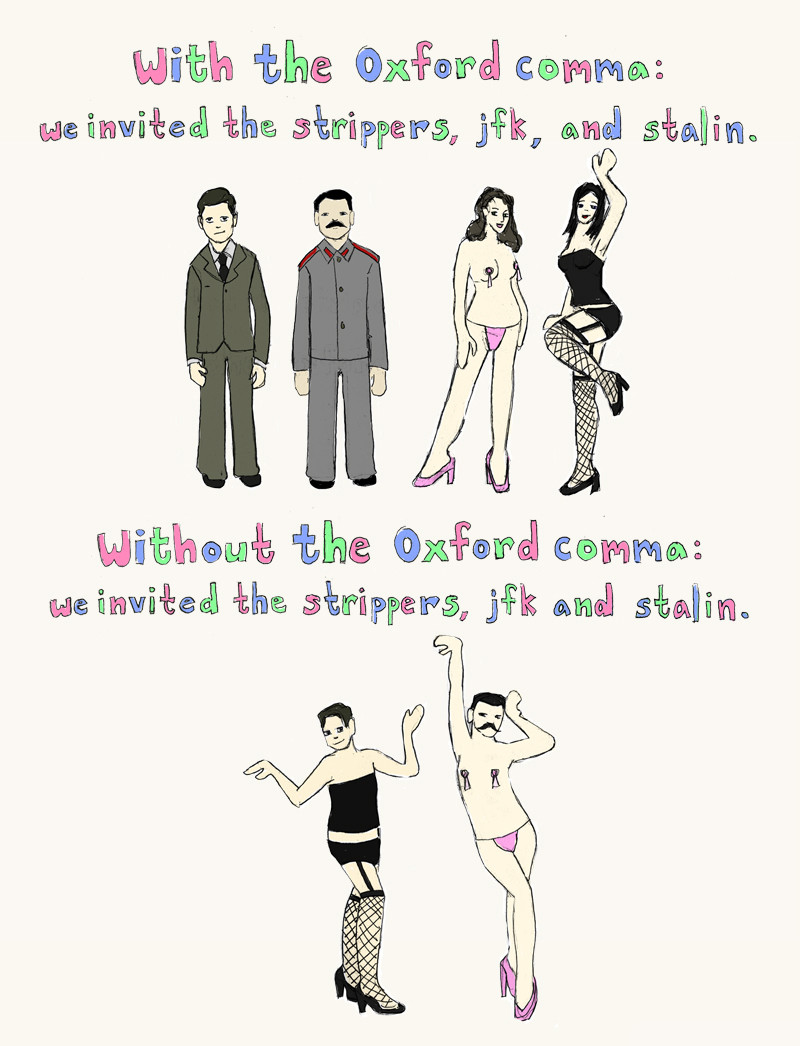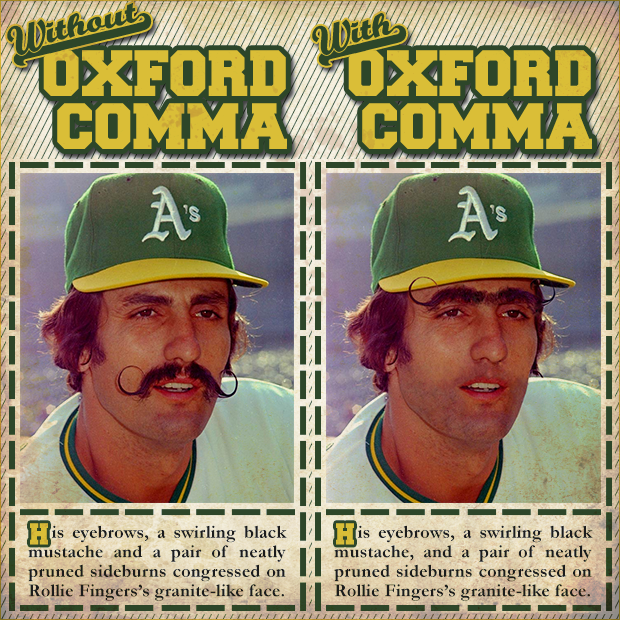A Comma Misconception

Deep in the bowels of the Bodleian Library at The University of Oxford sits a dusty old tome recounting the secret history of the Oxford comma. To no one’s surprise who opens it, it’s a tale of quibbling editors and journalism students with unmerited senses of superiority.
It begins in a 1915 Oxford dorm with the first recorded argument over the Oxford comma, the contents of which are basically repeated verbatim in every Oxford comma argument thereafter. The debate started when roommates Aldous Huxley and J. R. R. Tolkien were writing home to their parents that they needed money for “pizza, booze[,] and rubbers."
Huxley, a telecomm major and staunch AP Stylebook defender, threw his dog-eared copy at Tolkien, citing the oft-referenced punctuation section, which recommends against the extra comma. The radical, drug-using women's studies major Tolkien, however, was all for it and retorted that this was the same guide that still spelled it “e-mail” and the same guide that suggested the capital of West Virginia be written “Charleston, W. Va.” He then showed Huxley this cartoon that he thought proved his point while also being “totally hilarious."

So the argument went, and so went every argument enumerated in the book up until the one that took place in the Nebo office on Thursday, March 7, 2013. That’s the day I decided I would no longer participate in these asinine quarrels while so many commas went spliced and dates unpunctuated.
People love to throw their hat in the ring when this topic comes up because they feel like it’s a grammar subject they might actually have a tenuous grasp on; but the same people who see fit to bicker over the use of an Oxford comma, a style choice, are probably guilty of breaking many of the hard-and-fast rules of comma use, some of which will be discussed later. But first:
Eschew Obfuscation
Never before has so much ink been spilled over such an unworthy, diminutive thing as the Oxford comma. Now more than ever, I advise against it as the digital world is putting character count at a premium in Tweets, text ads and tiny display ads. However, trifling prevails and arguments persist. Here’s why you should never join in.
Let’s take another look at that cartoon. I must admit that it’s pretty accurate, but only in that I believe that’s exactly where an Oxford comma belongs: in the tawdry trappings of a sentence about strippers, a Communist and a married man who cavorted around with Marilyn Monroe. The only problem is that it doesn’t prove anything.
Make it a singular stripper; then you’ve got, “We invited the stripper, JFK, and Stalin.” Now your Oxford comma has made our first Catholic president a stripper and left a mass-murderer unscathed, whereas without it (“We invited the stripper, JFK and Stalin”), you would have avoided ambiguity for the exact same reason omitting the Oxford comma created ambiguity with plural strippers. Either way, the second item in the list could be mistaken for an appositive.
I didn’t take the time to find out who created that little web gem about the strippers, but I too can engage in reductio ad absurdum. Behold.

Look upon your works, ye Oxford comma proponents, and despair. You’ve turned one of the most well-groomed sentences of all time into an unkempt monstrosity. The point is simply to write clearly or, as the old fumblerule goes, “Eschew obfuscation. Espouse elucidation.” If one comma or lack thereof creates ambiguity in your writing, then you lack either the imagination or ambition to change your syntax.
The Real Problem
The comma wears many hats, and none of them has anything to do with where you think there’s a natural break when you read a sentence to yourself. The comma exists to separate elements of a sentence and aid the writer in his or her pursuit of clarity. However, it’s been showing up in increasingly strange places these days.
I blame this on the Internet, a place with seemingly billions of publishers and maybe two or three editors. The same has been happening with the apostrophe, the comma’s cousin from above the mean line (we use apostrophe’s everywhere in the 2010’s). Like the Dukes of Hazzard, the comma is always finding itself in sticky situations it has no business being in.
Take the time to absorb the following rules. Your copy or prose will gain credibility, and you will avoid the rolling eyes of pedants. Let’s begin with perhaps the most common unnecessary comma use.
The Compound Predicate
This issue is rarely talked about but is exceedingly common. Note the punctuation of the previous sentence. Many writers will insert a comma after “about” so that the sentence reads, “This issue is rarely talked about, but is exceedingly common.” The phrase “but is exceedingly common” is the second part of the single predicate “is rarely talked about but is exceedingly common,” both referring to “this issue.” Subject–predicate. If you remember your language arts, that constitutes a simple sentence.
Using a comma in these situations could arise from a fear of creating a run-on sentence. Just count your independent clauses. If there’s only one, then you can’t have a run-on.
Subordinating Conjunctions
These are words such as “because,” “when,” “while” and “as” that set off dependent clauses. Dependent clauses are not complete thoughts, and sentences with them do not need them to make sense.
“I sweat because it’s hot in here.” “I sweat” is an independent clause, capable of standing alone. “Because it’s hot in here” is a dependent clause, “because” being the subordinating conjunction. When it comes after the independent clause, dependent clauses beginning with subordinating conjunctions don’t need commas preceding them. Some people become more inclined to insert a comma there as the sentence gets longer (I held on to the firework too long and burned my hand[,] though I tried not to), but it’s still not necessary.
The Easy Stuff
I consider the easy stuff things that might stand out to you or things for which you feel like there’s a rule. This could include placing commas in addresses, dates, quotes or instances of direct address. In these cases, having a stylebook or doing a simple Google search can be really useful. However, we can knock some of them out right here and now.
- Dates: It took place Thursday, May 8, 2013, on Marietta Street. It took place in May 2013.
- Places: Our office is located at 1031 Marietta St. NW, Atlanta, Georgia.
- Quotes: She said, “You are pedantic.” She said that I was “pedantic.”
If you keep an eye out for it, then you’ll start noticing misused commas everywhere, and those Oxford commas will start to look increasingly inconsequential. All I ask for is consistency. As Stephen Colbert says, “Pick a side. We’re at war.” If I’m editing the work of someone who uses the Oxford comma but forgets it one time, I see that as a green light to remove them all. The war we’re in is one of both attrition and description.
The Oxford comma is a subject for the interloper grammarian. If your goal is to sound smart or professional, then don’t participate in one of these arguments; Huxley and Tolkien would go on to be moderately successful, but only after one of them said, "Whatever, braj. It probably doesn't matter. Let's go smoke some beers." Instead of worrying about this one style choice, try to appreciate the comma, your companion in the battle for clarity, for his entire skillset. Your skillset as a writer will grow because of it.
–––
Comments
Add A CommentSeriously? Your image is a terrible example as you've actually inverted the meaning one would get with and without the serial comma. It's so far off that it genuinely makes it impossible to seriously consider any of your subsequent assertions.
This is garbage. You’re weird baseball player is still incorrect. The only reason oxfords fell out of popularity was to save space in newspapers. It was never intended to be the norm.
If you're going to be a proponent of descriptive linguistics, why don't you mention that commas represent actual pauses in enunciation? That serial comma IS pronounced.
Thanks, Chris!
My opinion is that your goal should be both clarity and consistency. Therefore, if one sentence doesn't make sense using the style you've already established, then change the syntax so that it does.
Again in the long run, I know it's pretty inconsequential, and the ultimate goal is to communicate clearly. And don't worry. You didn't misuse any commas...although the comparative of clear is "clearer." Haha JK. You my boy.
Nice post, John!
However, I disagree that consistency is the final test.
If I write an essay and in one paragraph have your strippers sentence and in another have your eyebrow sentence, I shouldn't botch one of them just to be consistent.
The final measure is always, "Does this help make the sentence more clear?"
Also, I apologize ahead of time if I misused a comma in this comment :)